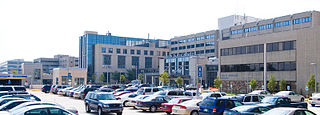
MountainView Hospital & Medical Center is a for-profit hospital owned by the Hospital Corporation of America, and operated by Sunrise Healthcare System. The 420-bed hospital is located in Las Vegas, Nevada.

Highmark is an American non-profit healthcare company and Integrated Delivery Network based in Pittsburgh, Pennsylvania, United States. It is a large individual not-for-profit health insurer in the United States, which operates several for-profit subsidiaries.

Geisinger Health System (GHS) is a regional health care provider to central, south-central and northeastern Pennsylvania. Headquartered in Danville, Pennsylvania, Geisinger services over 3 million patients in 45 counties.

WellSpan Health is an American integrated health system located in South-Central Pennsylvania and parts of northern Maryland. Headquartered in York, Pennsylvania and employing about 20,000 people, WellSpan Health operates eight hospitals : WellSpan York Hospital, WellSpan Gettysburg Hospital, WellSpan Ephrata Community Hospital, WellSpan Good Samaritan Hospital, WellSpan Chambersburg Hospital, WellSpan Waynesboro Hospital, WellSpan Philhaven, and WellSpan Surgery and Rehabilitation Hospital. WellSpan operates over 220 patient care locations which offer services such as diagnostic imaging, laboratory services, rehabilitation facilities, primary care facilities, urgent care facilities, specialty centers, medical equipment retail, and retail pharmacies.
UPMC Somerset is a non-profit, general acute care community hospital that was founded on January 31, 1921 and is located at 225 South Center Avenue Somerset, Pennsylvania 15501. It has 111 licensed beds and five operating rooms making it the largest hospital in Somerset County.

Blue Cross Blue Shield Association, also known as BCBS, BCBSA, or The Blues, is a United States-based federation with 33 independent and locally-operated BCBSA companies that provide health insurance in the United States to more than 115 million people as of 2022.

Universal Health Services, Inc. (UHS) is an American Fortune 500 company that provides hospital and healthcare services, based in King of Prussia, Pennsylvania. In 2023, UHS reported total revenues of $14.3b.
Henry Ford Health is an integrated, not-for-profit health care organization in Metro Detroit. The corporate office is at One Ford Place, in Midtown Detroit, Michigan. Henry Ford established the health system in 1915, and it is currently run by a 15-member board of directors. Henry Ford Health also owns the health insurance company Health Alliance Plan.
Nursing management consists of the performance of the leadership functions of governance and decision-making within organizations employing nurses. It includes processes common to all management like planning, organizing, staffing, directing and controlling. It is common for registered nurses to seek additional education to earn a Master of Science in Nursing or Doctor of Nursing Practice to prepare for leadership roles within nursing. Management positions increasingly require candidates to hold an advanced degree in nursing.
Prime Healthcare Services is a United States privately held healthcare company. It was established in 2001, by chairman and CEO Prem Reddy, MD, and operates 44 hospitals in 14 states. It is affiliated with the nonprofit Prime Healthcare Foundation.
Melinda L. Estes is president and CEO of Saint Luke's Health System, based in the bi-state Kansas City-metro area. Estes is a board-certified neurologist and neuropathologist. Prior to joining Saint Luke's Health System in September 2011, she served as president and CEO of Fletcher Allen Health Care, based in Burlington, Vermont since October 2003.
Newark Beth Israel Medical Center (NBIMC), previously Newark Beth Israel Hospital, is a 665-bed quaternary care, teaching hospital located in Newark, New Jersey serving the healthcare needs for Newark and the Northern Jersey area. The hospital is owned by the RWJBarnabas Health System and is the third-largest hospital in the system.
Independence Blue Cross (Independence) is a health insurer based in Philadelphia, Pennsylvania, in the United States. Independence is the largest health insurer in the Philadelphia area, serving people in the region and seven million nationwide.
Swedish Hospital is a 312-bed nonprofit teaching hospital located on the north side of Chicago, Illinois. The hospital offers over 50 medical specialties, including neurosurgery for the spine and brain, integrative cancer care, heart services, women's health services, childbirth and emergency services. The hospital has more than 600 physicians and 2,500 employees. The hospital is accredited by the American Osteopathic Association's Healthcare Facilities Accreditation Program.
Occupational health nursing is a specialty nursing practice that provides for and delivers health and safety programs and services to workers, worker populations, and community groups. The practice focuses on promotion, maintenance and restoration of health, prevention of illness and injury, and protection from work‐related and environmental hazards. Occupational health nurses (OHNs) aim to combine knowledge of health and business to balance safe and healthful work environments and a "healthy" bottom line.

The Pennsylvania Health Care Quality Alliance (PHCQA) is a nonprofit group of healthcare organizations, including the Hospital and Healthsystem Association of Pennsylvania, which represents more than 225 hospitals and health systems across Pennsylvania in the United States.

Lehigh Valley Health Network is a subsidiary of Jefferson Health. Prior to its August 2024 acquisition by Jefferson Health, Lehigh Valley Health Network was an independent healthcare network based in the Allentown, Pennsylvania in the Lehigh Valley metropolitan region of eastern Pennsylvania. The healthcare subsidiary serves the Lehigh Valley and Northeastern Pennsylvania regions of Pennsylvania.
Patricia Anne Gabow is an American academic physician, medical researcher, healthcare executive, author and lecturer. Specializing in nephrology, she joined the department of medicine, division of renal diseases, at the University of Colorado School of Medicine in 1973, advancing to a full professorship in 1987; she is presently Professor Emerita. She was the principal investigator on the National Institutes of Health Human Polycystic Kidney Disease research grant, which ran from 1985 to 1999, and defined the clinical manifestations and genetics of the disease in adults and children.







